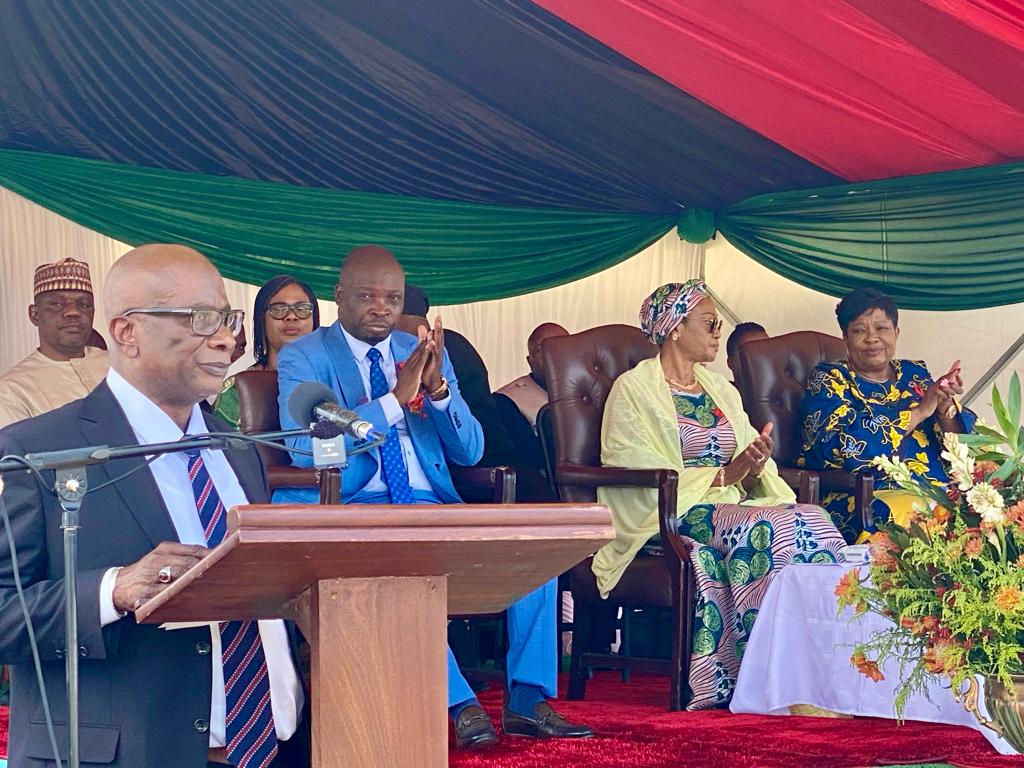|
Getting your Trinity Audio player ready...
|
Involving and engaging the community is a critical HIV response that will lead to ending AIDS by 2030, HE Edward Kallon, the United Nations Resident and Humanitarian Coordinator for Zimbabwe has said.
He made the remarks while representing the UN System in Zimbabwe at the commemoration of World AIDS Day today in Victoria Falls.
In attendance were the Guest of Honour, Her Excellency Dr. Auxillia Mnangagwa, First Lady of the Republic of Zimbabwe; Honourable Richard Moyo, Minister of State and Devolution for Matebeleland North Provincial Affairs; Dr. Douglas T. Mombeshora, Minister of Health and Childcare; Excellencies First ladies of Nigeria and Botswana; Dr. Bernard Madzima, Chief Executive Officer of the National AIDS Council; Ms. Elaine French, USA Embassy Charge d’Affaires; Ms. Winnie Byanyiwa, UNAIDS Executive Director and other UN Officials; Dr. David Parirenyatwa, the Society for Aids in Africa (SAA) President; ZNNP+ Board Chairperson and people living with HIV; and Members of the Media, among others.
The theme for this year’s World AIDS Day is “Let Communities Lead,” recognizing the vital role that communities play in shaping the HIV response and promoting global health.
HE Kallon paid tribute to the First Lady for her dedication to community engagement and extensive work with communities in the response to HIV and other noble causes.
“Her efforts extend beyond HIV, encompassing broader mobilization endeavours for the nation’s Vision 2030, which seeks to create an upper middle-income society in Zimbabwe and achieve the Sustainable Development Goals by 2030.
“Recently, as development partners, we were fortunate to witness the First Lady’s incredible work in a rural district. She supported and mobilized communities to expand health services, demonstrating the power of community leadership and engagement in responding to HIV and other development needs,” he said.
Zimbabwe has experienced the transformative potential of community involvement in various aspects, including the mobilization of resources under the AIDS Levy, the establishment of schools and teachers in every corner of the country, efforts in combating natural disasters like Cyclone Idai, and more recently, in tackling the challenges posed by COVID-19.
The Government of Zimbabwe recognizes the importance of community leadership and has placed emphasis on devolution as a policy.
This was evident in the national campaign against gender-based violence, launched with rural communities last weekend during the 16 days of activism, which highlights the value of empowering communities to lead. By giving communities the power to take charge, stakeholders increase the likelihood of finding effective solutions not only in ending AIDS but also in other areas.
According to the 2022 Zimbabwe epidemic status report, approximately 1.3 million people, accounting for 8.7% of the total population, are People living with HIV. Tragically, 20,000 lives have been lost to AIDS-related illnesses in the same year. The impact on women is particularly significant, as women make up 61% of the 1.2 million adults living with HIV.
“While Zimbabwe has made commendable progress in the fight against the HIV epidemic, we still face numerous challenges in achieving our goal of ending AIDS. These challenges include disparities in access to HIV services based on age, gender, and geography. Adolescents and young women are disproportionately affected by new infections, while children and key populations have limited access to services. National-scale implementation of programmes targeting adolescent girls and young women from key and vulnerable populations is yet to be achieved,” HE Kallon added.
To effectively end the pandemic in line with the 2030 Agenda for Sustainable Development, HE Kallon encouraged four critical actions, including:
- The need to scale up HIV prevention and treatment programmes to cover all subpopulation groups, with a particular focus on adolescent girls and young women.
- community leadership and the engagement of men are crucial in addressing social norms related to gender equality and gender-based violence.
- enacting and enforcing laws and policies for key population groups is essential, and sustaining initiatives like social contracting and strengthening evidence generation for key and vulnerable populations.
- allocation of adequate funding and economic opportunities to communities as they connect individuals to person-centered public health services, foster trust, and hold providers accountable.
- ending stigma and discrimination. To ensure no one is left behind, we must prioritize the strategic priorities outlined in NDS1, the 2022-2026 UN Cooperation Framework, and the Global AIDS Strategy, all of which put people first.
“On this World AIDS Day, I call on all stakeholders including the UN to continue supporting Her Excellency the First Lady Amai Mnangagwa and the Government of Zimbabwe in enabling and empowering communities to take on leadership roles. Comprehensive and reliable funding, as well as capacity-building support, are critical to delivering inclusive and quality services. Furthermore, creating an enabling environment that facilitates community involvement in decision-making and protects the human rights of all, especially marginalized and key populations, is of paramount importance.”
Meanwhile, Citizens In Action Southern Africa (CIASA) said climate change has emerged as a significant threat to global health, exacerbating existing health disparities and disproportionately impacting vulnerable populations, including those living with HIV/AIDS.
“The effects of climate change, such as extreme weather events, water scarcity, and food insecurity, can disrupt HIV treatment adherence, increase the risk of opportunistic infections, and jeopardize access to essential health services.






